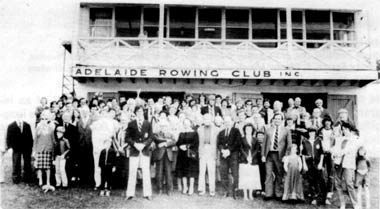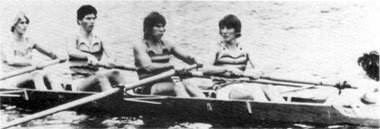Adelaide Rowing Club - The First Hundred Years
A Narrative History 1882-1982 - Compiled by R W Richardson
Table of Contents
Chapters
- Introduction
- I Zingari: The Origin of the Club
- Narrative History of ARC: 1882-1887
- 1887-1892
- 1892-1897
- 1897-1902
- 1902-1907
- 1907-1912
- 1912-1922
- 1922-1927
- 1927-1932
- 1932-1937
- 1937-1942
- 1942-1947
- 1947-1952
- 1952-1957
- 1957-1962
- 1962-1967
- 1967-1972
- 1972-1977
- 1977-1982
- Early Days of Rowing on the Murray
- Memoirs of my Association with the ARC and Rowing Men
- ARC's Famous Coxswains Over the Years
- Get Fit for Autumn—How to do it
- Notable ARC Coaches
- ARC at War
- Pity the Poor Hon. Secretary!
Appendices
21. Narrative History of the Adelaide Rowing Club - 1977-1982
Chapter twenty-one page 1 2
Season 1979-80
The Premiership win stimulated membership, as expected, but having expert oarsmen paradoxically did not help the Club win races. These men were grabbed for the State Elite Squad, 50% of whom were from Adelaide Rowing Club, and not available to compete for points races in regattas held anywhere near the National Titles regatta at Ballarat.
Even after Ballarat, which was disappointing in many ways for South Australians, six A.R.C. rowers were selected to perform for selection in crews to row for Australia in the Olympic Games. Two of these, Henry Duncan and Bruce Keynes, went away to Moscow. This, while a great honour for those members, comprehensively denied the Club the use of that talent for winning another Premiership.
Willie Hay's philosophy was becoming all too clear. The real source of pride Adelaide Rowing Club members must learn to recognise is not in winning enough races for a State Premiership, but in the strength of our contribution to South Australia's effort at the King's Cup and national contests, and every four years to Australia's results in the rowing Olympics.
A pity, in a way, because the fund raising of last season resulted in the purchase of two magnificent new racing boats, a 4 and an 8, the I Zingari XV, both built right here in South Australia by G.H. King of Peterhead.
There was a surplus in Club activities income over expenditure of $530 which, when added to the net profit from bar trading of $5,060, was a welcome sign, reflecting expert control, first by Dave Richards and then by Andrew Jeffery.
Two more well known members who joined in the late thirties died relatively young - Colin Walker, a former auditor and very active Vice-President, and John Jaffray, popular clubman and benefactor, who was the man behind the construction of the licensed premises and bar. Both were sadly missed.
The Club crews this season, notwithstanding the depredations of the Elite Squad under coach Willie Hay, won a creditable number of races, the rowers in some of which were members who last year were only active in social events, but who knuckled down and worked hard in the boat.
After last season's social atmosphere of Mardi Gras, Club events were quite atypical and low key; restrained, yet well attended and conducted, and the new arrivals gave fresh promise for a successful season to follow.
A new racing pair and a new racing 4 were needed, to cost $6,500, so fund raising would have to be stepped up further to meet this, and this would fall on the bar and Vice-Presidents.
Season 1980-81
The new committee was basically the same as last season's, save for Chester Macdonald coming in as Vice-Captain, and Andrew Jeffrey as Treasurer, the position he had ably taken for most of the previous season during Ian Sanders' long illness. They got down to the business of raising funds for the two boats needed, but the setback of wrecking a pair worth $2,000, a scull and a trailer, made things difficult, especially as the insurance company took ages to come to settlement.

Opening Day, October 1980.
C. Amiel, W. Hay, McFarling, Bruce Keynes, Rex Wallman, Colin Runge, Russell Osman, Klaas Buys, Ian Sanders, Guy Hebblewhite, Bill Stephenson, Jean -, Doug Howie, Arch Trickett, -, Bob Richardson, Charlie Winter (in front), Ian Hamilton (Jean Osman behind him), The Lady Mayoress, Ken Milne, The Lord Mayor, J. V.S. Bowen esq., John Clutterbuck and daughter.
The rowing squads really got busy winning races early in the season at Berri and Waikerie, but State selections in January made big gaps, especially in the Senior Squad, from which six of their best men were claimed for King's cup and national titles crews, namely Henry Duncan, Bruce and Graham Keynes, Rob Lang, Chester Macdonald and Charlie (Nigel) Winter, while Hugh McLean went to the youth crew, which Paul Jeffries coached. But the honour and glory those men brought by winning the King's Cup for South Australia more than compensated for their absence on that mission - it was South Australia's first win since 1937!
Torrens Rowing Club finished up winning the State Premiership by the narrowest of margins. Right up to the final regatta, if Adelaides had won it, we would have gone Premiers, and we were 3 1/2 points ahead with three regattas remaining; but it was not to be.
To keep these magnificent men rowing, many functions were held and much money was borrowed at exorbitant Interest rates, so that the situation resembled a cat chasing its own tail. In October Hugh McLean and Martin Smart rowed for 24 hours in order to try to break a world record for kilometres rowed in that period. This they did by exceeding 204km. and by sponsorship of that effort they raised $2,168, which incidentally proved surprisingly difficult to collect once the wonder of the event had been conveniently forgotten.
Three discos were organised in the licensed premises, and these brought in around $1,000 each, thanks to the super efficient bar management of Andrew Jeffrey, whose profit margin was well over 40% for the year, a magnificent effort.
The Lord Major, when he declared the season open in October, had named the new racing 4 Hunter VI, and this was whisked off for the use of the State Squad, as was the new racing pair named ‘Larrapinta', presumably after an Australian river, and that, like many Australian rivers, also disappeared during the summer for the exclusive use of the State pair, Chester Macdonald and Graham Keynes.

1980 Four
Mark Williams, bow, Mark Hill, 2, Graham Keynes, 3, Chester Macdonald, str., Wayne Gutschmidt, cox.
Not only did Big Brother take our best oarsmen, our best boats, (on hire, admittedly), but S.A.R.A. dues this season went up to $6,300, and even then, every man who went to Queensland to contest the national titles had to find $350 for his "seat". A dinner was held to help contribute towards that figure.
The Vice-Presidents sold 47 dozen bottles of vintage port to raise over $1,400, and the Club sold its next best pair for $2,500, and raised the subscriptions and the rental to the various schools and women rowers whose boats occupied the Club's racks, but still could make little headway against the dreadful shadow of Interest payments, especially when a new boat trailer had to be paid for, damaged boats repaired and security devices installed against burglary.
Winning regattas seemed to be a simple exercise compared with keeping the Club afloat.
During its hundredth season the Club's oldest inhabitant died. Ken Milne, at 94, a great character, a great benefactor and an example to every member, having made a bequest to his old Club in his Will, sculled away into the sunset.
